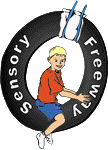SENSORY FREEWAY
THERAPY SERVICES
Tel. 718-238-7451
Fax 718-238-2765
Sensory Freeway
8746 20th Avenue
Brooklyn, NY 11214
ph: 718-238-7451
fax: 718-238-2765
alt: 718-238-5458
info
PARENT'S GUIDE
Sensory Integration problems affect the mood, development and education of many babies and children, and yet chances are you have never heard of it unless your child is examined by an occupational, physical, or speech therapist.
Frequently Asked Questions
- How do I know if my infant/toddler needs therapy services?
If your young child is experiencing 3 or more problems on this checklist, professional therapy intervention may be helpful.

- Easily startled (birth to 3 months)
- Poor muscle tone
- Difficulty consoling self, unusually fussy
- Unable to bring hands together and bang toys
- Slow to roll over, creep, sit or stand
- Difficulty babbling
- Failure to explore
- Cries or becomes tense when moved through space
- Frequent fisting of hands after six months
- Difficulty tolerating a prone (on stomach) position
- Dislikes baths
- Resists being held, dislikes being cuddled, becomes tense when held
- Unable to settle down, sleep difficulties
- Overly active, seeks excessive movement
- Sucking Difficulties
- Difficulty playing with age appropriate toys
- How do I know if my pre-school-age child (3 to 5 years) needs therapy services?
If your young child is experiencing 3 or more problems on this checklist, professional therapy intervention may be helpful.

- Says "I can't" or "I won't" to age appropriate self-care or play activities
- Low muscle tone; seems weak or floppy
- Clumsy, falls frequently
- Bumps into furniture or people, and has trouble judging body in relation to space around him/her
- Breaks toys or crayons easily
- Does not enjoy jumping swings or having feet off the ground
- Dislikes coloring in lines, doing puzzles, or cutting with scissors
- Delayed language development
- Overly active, unable to slow down, moves quickly from one toy to another
- Difficulty focusing attention, or over-focused and unable to shift to the next task
- Dislikes back cuddling, or haircuts
- Over-reacts to touch, taste, sounds, or odors
- Avoids playground activities
- Unable to settle down, sleep difficulties
- Needs more practice than other children to learn new skills
- How do I know if my school age child needs therapy services?
If your child is experiencing 3 or more problems on this checklist, professional therapy intervention may be helpful.

- Difficulty focusing attention or over-focused and unable to shift to the next task
- Low muscle tone; tends to lean on arms or slumps at desk
- Needs more practice than other children to learn new skills
- Reverses letters such as b and d, can't space letters on the lines
- Breaks pencils frequently or writes with heavy pressure
- Does not enjoy jumping, swings or having feet off the ground
- Dislikes handwriting, tires quickly during written class work
- Difficulty paying attention or following instructions
- Overly active, unable to slow down
- Poor self-esteem, lack of confidence
- Dislikes swimming, bathing, hugs, and/or hair cuts
- Over-reacts to touch, taste, sounds, or odors
- Avoids physical education or sports activities
- Finds it difficult to make friends with children of the same age, prefers to play with adults or younger children rather than peers
- Difficulty following several step instructions for motor tasks
- Difficulty playing with age appropriate toys
- When would therapy services be helpful to an adult?
If your you or an adult is experiencing 3 or more problems on this checklist, professional therapy intervention may be helpful.
 Difficulties with balance; becomes disoriented and/or fearful on elevators or escalators
Difficulties with balance; becomes disoriented and/or fearful on elevators or escalators- Fatigues easily; tends to lean on arms or slump at desk
- Accident-prone, clumsy or awkward in daily activities
- Dislikes crowds or accidental jostling in public situations (standing in line at the movie theater or shopping in store aisles)
- Low tolerance for approach from behind or unexpected touch
- Difficulty in maintaining intimate relationships, difficulty with physical closeness, hugs or cuddling
- Disorganized in work or home activities
- Difficulty following several step instructions for motor tasks
- Difficulty with driving, parking, shifting gears or entering freeways
- Poor self-esteem, lack of confidence
- Difficulty focusing attention or over-focused and unable to shift to next task
Call us for to set up a screen or evaluation!
Our highly qualified, licensed and SIPT certified staff is ready to help your child reach their highest potential despite any difficulties they may have.
Copyright 2011 Sensory Freeway. All rights reserved.
Sensory Freeway
8746 20th Avenue
Brooklyn, NY 11214
ph: 718-238-7451
fax: 718-238-2765
alt: 718-238-5458
info
